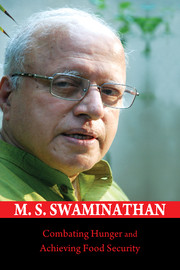Book contents
- Frontmatter
- Contents
- Foreword
- Preface
- Acknowledgements
- Abbreviations
- 1 Genesis and Growth of the Yield Revolution in Wheat
- 2 Our Agricultural Heritage
- 3 Shaping Our Agricultural Destiny
- 4 Thrust on Farm Revival
- 5 Nutri-farm Movement
- 6 Nutrition-sensitive Agriculture
- 7 Food Losses and Food Waste
- 8 Rice in Zero Hunger Challenge
- 9 Monsoon Management
- 10 Importance of Ecological Conservation
- 11 Caring for Ecology and Heritage
- 12 Conserving Biodiversity
- 13 Overcoming Hidden Hunger through Aquaculture
- 14 Biofuels – The Way to Go
- 15 Food Security
- 16 Vigilance for Sustainable Food Security
- 17 Food Security and Social Protection
- 18 Food Security and its Role
- 19 Sustaining the Livestock Revolution
- 20 Challenges in the Year of Science
- 21 Agriculture and Humanism
- 22 Fostering the Science of Science Communication
- 23 Olympic Move for Saving Children
- 24 Youth: The Agents of Change
- 25 Role of Women in Agricultural Production
- 26 Know-how to Do-how
- 27 From Bengal Famine to Right to Food
- 28 Financial Institutions and Fighting Food Inflation
- 29 Public Good Research in Agriculture
- 30 The Future of Indian Agriculture
- Bibliography
23 - Olympic Move for Saving Children
Published online by Cambridge University Press: 18 December 2015
- Frontmatter
- Contents
- Foreword
- Preface
- Acknowledgements
- Abbreviations
- 1 Genesis and Growth of the Yield Revolution in Wheat
- 2 Our Agricultural Heritage
- 3 Shaping Our Agricultural Destiny
- 4 Thrust on Farm Revival
- 5 Nutri-farm Movement
- 6 Nutrition-sensitive Agriculture
- 7 Food Losses and Food Waste
- 8 Rice in Zero Hunger Challenge
- 9 Monsoon Management
- 10 Importance of Ecological Conservation
- 11 Caring for Ecology and Heritage
- 12 Conserving Biodiversity
- 13 Overcoming Hidden Hunger through Aquaculture
- 14 Biofuels – The Way to Go
- 15 Food Security
- 16 Vigilance for Sustainable Food Security
- 17 Food Security and Social Protection
- 18 Food Security and its Role
- 19 Sustaining the Livestock Revolution
- 20 Challenges in the Year of Science
- 21 Agriculture and Humanism
- 22 Fostering the Science of Science Communication
- 23 Olympic Move for Saving Children
- 24 Youth: The Agents of Change
- 25 Role of Women in Agricultural Production
- 26 Know-how to Do-how
- 27 From Bengal Famine to Right to Food
- 28 Financial Institutions and Fighting Food Inflation
- 29 Public Good Research in Agriculture
- 30 The Future of Indian Agriculture
- Bibliography
Summary
On 12 August 2012, the closing day of the London Olympics, a largely unnoticed and unsung event took place. The Prime Minister of the United Kingdom, David Cameron, launched on that day, along with the Vice President of Brazil, Michel Temer, and double Olympic gold medal winner, Mo Farah, a programme designed to rescue 25 million children from malnutrition-induced stunting between now and 2016, when the next Olympics will take place at Rio de Janeiro in Brazil. This is of particular interest to India, since according to the National Family Health Survey-3 (NFHS-3; 2005–06), 43.1 per cent of girls and 41.9 per cent of boys under the age of five in India are underweight. Such widespread prevalence of malnutrition was described by India's Prime Minister as ‘a national shame’. It is now fashionable to add the term ‘inclusive’ before growth. Maternal and foetal under-nutrition and malnutrition lead to children being born with LBW. Such children are denied even at birth, an opportunity to fully express their innate genetic potential for physical and mental development. This is the cruelest form of exclusion in a development paradigm dedicated to the cause of social, gender and economic equity.
The Olympic hunger event led to the announcement of three new initiatives by the UK Department of International Development (DFID). These initiatives include mobilizing science and innovation for marrying agriculture and nutrition, involving the private sector food industry, and enhancing government accountability in the area of timely response to the needs of ‘nutrition hotspot’ areas. The emphasis at the London meeting was on promoting partnership among government, business, NGOs and the media for overcoming widespread endemic and hidden hunger (caused by the deficiency in the diet of micronutrients like iron, zinc, vitamin A, vitamin B12, folic acid and essential amino acids like lysine in protein). It was agreed that the first 1,000 days in a child's life, that is, from conception to the end of two years, need particular attention to prevent the child from facing several disabilities in later life, such as impaired cognitive ability. Our country is in danger of facing intellectual dwarfism if we do not combat maternal and foetal malnutrition.
Globally, overcoming hunger and malnutrition is now getting increasing political, public, professional and media attention.
- Type
- Chapter
- Information
- Combating Hunger and Achieving Food Security , pp. 123 - 126Publisher: Cambridge University PressPrint publication year: 2016



